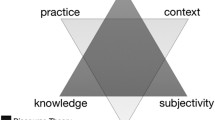Abstract
This essay argues that the really useful character of reflexivity is that it enables a radical critique of representation and its conventional material and rhetorical practices. It is uniquely able to produce paradox and thus disrupt discourses by undermining authorial privilege. Because Fuller's social epistemology is insensitive to its own reflexive implications, and limits itself to normative questions about knowledge policy, it is too limited — and limiting — to provide a context that can nurture reflexivity.
Similar content being viewed by others
References
Ashmore, M.: 1989,The Reflexive Thesis: Wrighting Sociology of Scientific Knowledge, Chicago, Chicago University Press.
Ashmore, M.: 1993, ‘The Theatre of the Blind: Starring a Promethean Prankster, a Phoney Phenomenon, a Prism, a Pocket, and a Piece of Wood’,Social Studies of Science 23: 67–106.
Ashmore, M., Mulkay, M. and Pinch T.: 1989,Health and Efficiency: A Sociology of Health Economics, Milton Keynes, Open University Press.
Barnes, B. and Bloor, D.: 1982, ‘Relativism, Rationalism and the Sociology of Knowledge’, in Hollis, M. and Lukes, S. (eds.),Rationality and Relativism, Oxford, Basil Blackwell.
Collins, H.: 1985,Changing Order: Replication and Induction in Scientific Practice, London and Beverly Hills, Sage.
Fuller, S.: 1988,Social Epistemology, Bloomington and Indianapolis, Indiana University Press.
Gruenberg, B.: 1978, ‘The Problem of Reflexivity in the Sociology of Science’.Philosophy of the Social Sciences 8: 321–43.
Hacking, I.: 1983,Representing and Intervening, Cambridge, Cambridge University Press.
Latour, B.: 1987,Science in Action, Milton Keynes, Open University Press.
Lynch, W. T. and Fuhrman, E.R.: 1991, ‘Recovering and Expanding the Normative: Marx and the new Sociology of Scientific Knowledge’,Science, Technology, and Human Values 16: 233–248.
Pickering, A.: 1984,Constructing Quarks: A Sociological History of Particle Physics, Edinburgh, Edinburgh University Press; Chicago, University of Chicago Press.
Pinch, T.: 1986,Confronting Nature: The Sociology of Solar-Neutrino Detection, Dordrecht and Boston, Reidel (Kluwer).
Sapp, J.: 1990,Where the Truth Lies: Franz Moewus and the Origin of Molecular Biology, Cambridge, Cambridge University Press.
Shapin, S. and Schaffer, S.: 1985,Leviathan and the Air-Pump: Hobbes, Boyle and the Experimental Life, Princeton, Princeton University Press.
Stove, D.: 1982:Popper and After: Four Modern Irrationalists, Oxford, Pergamon.
Woolgar, S.: 1988,Knowledge and Reflexivity: New Frontiers in the Sociology of Knowledge, London and Beverly Hills, Sage.
Woolgar, S.: 1992, ‘Some Remarks on Positionism: A Reply to Collins and Yearley’, in Pickering, A. (ed.),Science as Practice and Culture, Chicago, University of Chicago Press.
Author information
Authors and Affiliations
Rights and permissions
About this article
Cite this article
Ashmore, M. Social epistemology and reflexivity: Two versions of how to be really useful. Argumentation 8, 157–161 (1994). https://doi.org/10.1007/BF00733367
Issue Date:
DOI: https://doi.org/10.1007/BF00733367




